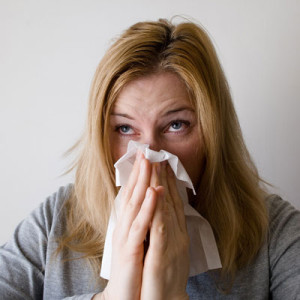Allergies, seasonal or year round, are an ongoing problem for many individuals. Seasonal allergies typically affect people during a particular season or time of year. They are also referred to as outdoor allergies and are generally triggered by tree, grass and weed pollens or outdoor mold spores. Year round allergies also known as indoor allergies are typically brought on by animal dander, dust mites, mold spores or insect allergens. There are also food allergies, which occur as a results of eating a culprit food, and can also create physical and/or emotional symptoms such as body hives, swelling, itching or redness of the skin, depression and/or moodiness.
 No matter what kind of allergy you suffer from, environmental or food related, acupuncture can provide needed relief. While medications (over-the-counter or prescribed) often come with unwanted side-effects, acupuncture does not. This makes acupuncture an appealing option for people looking for a new way to combat their allergies.
No matter what kind of allergy you suffer from, environmental or food related, acupuncture can provide needed relief. While medications (over-the-counter or prescribed) often come with unwanted side-effects, acupuncture does not. This makes acupuncture an appealing option for people looking for a new way to combat their allergies.
According to Chinese medical theory, the symptoms and signs that indicate a Western diagnosis of allergies relate to imbalances in the meridian and Organ Systems of the body. These imbalances may stem from a variety of causes, including stress, poor diet, constitutional weakness, pollutants and environmental toxins.
Over time, if imbalances remain within the body, they will affect the functions of the Organ Systems. Some of these Organ Systems are involved in the production of Wei Qi (pronounced “way chee”). According to the theories of acupuncture and Chinese medicine, it is important to have the correct quality and quantity of Wei Qi circulating around the body in order to stay healthy.
What is Wei Qi?
The Chinese concept of Wei Qi is similar to the Western concept of the immune system. Wei Qi functions to protect and defend the body against foreign substances, that if not caught can lead to allergies. When Wei Qi is strong and abundant, we remain healthy. When the supply of Wei Qi becomes deficient, health is compromised and we become vulnerable to foreign invaders such as dust, mold, animal dander, bacteria, viruses and pollen. People who have a Wei Qi deficiency are prone to allergies and frequent colds.
Acupuncture and Chinese medicine support and strengthen the systems of the body that are involved in the production of Wei Qi. By building up the supply of Wei Qi, and facilitating the smooth and free flow of it through the body, symptoms and signs related to allergies could be greatly reduced or eliminated.
Allergies according to Traditional Chinese Medicine (TCM) can be due to a variety of factors. Below are some of the more common TCM diagnoses that your acupuncturist
may discover and treat.
- Wei Qi deficiency
- Spleen weakness
- Kidney deficiency
- Lung deficiency
What will an acupuncturist do?
An acupuncturist will conduct a thorough exam, taking a complete health history. They will then develop a unique treatment plan that will address your specific concerns. The goals of the treatment plan will be to eliminate visible symptoms and signs, while addressing the root cause(s) and underlying imbalances affecting the quality and quantity of Wei Qi.
Acupuncture treatments fantastically combine with herbs, dietary changes, massage (tuina), or exercise. These therapies accelerate the healing process in order to balance, build, and support the health and functioning of your body’s systems.
What is the Functional Medicine Approach to Allergies?
The functional medicine approach to allergies starts with testing the adrenal system. We test your fight flight system by using an at home salivary test kit. You spit into several tubes over the course of 12 hours. Adrenal fatigue or adrenal exhaustion compromises the immune system. This results in a hyper-immune response leading to allergy symptoms. Adrenal fatigue compromises the digestive tract. This can lead to a leaky gut scenario that can cause food sensitivities or food allergies.
If we find that the acupuncture is not quite enough to quell the allergies, adding the functional medicine component usually does the trick.
Seasonal allergy tips:
- Flush your nose with a Neti pot.
- Add spicy foods and omega-3’s to your diet.
- Keep your windows closed during allergy season to prevent dust and pollen from entering.
- Put on a dust mask when you are doing yard or house work.
- Do not hang your clothes out to dry in the sun, as they
will gather dust, mold and pollen. - Come in for an acupuncture tune-up.
If you suffer from food allergies:
- Take an IgG food allergy test to find out exactly what the offending foods are. This test is available at my office.
- Avoid the foods that cause your reaction.
- Peanuts, the proteins in cow’s milk, shellfish, tree nuts, fish, eggs, gluten, wheat, eggs, corn and soy are the most common food allergies.
- It is possible to heal the gut with functional medicine. Healing the gut may allow you to eat some of the offending foods.
- Ask about ingredients at restaurants or when eating food prepared by another person.
- Read food labels carefully.
- Test and heal the adrenals.
Acupuncture, Chinese medicine and functional medicine are a drug-free, safe, natural and effective way to eliminate hay fever or allergies.
Allergy Resources:
For more information on allergies, check out this newsletter and article that I wrote for the SW Florida Health and Wellness Magazine.



